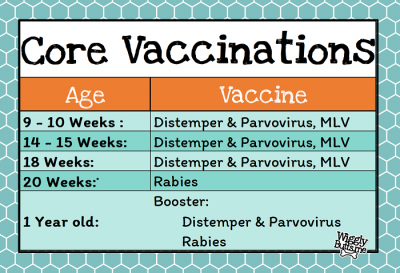Over vaccination is indeed a #FirstWorldProblem. It is a serious problem that can be fixed.

Keep reading if you:
- are unsure if you need vaccinate your dog
- are wondering if your dog is getting too many vaccines
- need help determining when to vaccinate your new puppy
- AND MORE!
Dog Vaccinations
To Vaccinate or not to Vaccinate
IF THIS IS A VETERINARY EMERGENCY PLEASE CALL YOUR VETERINARIAN OR POISON CONTROL IMMEDIATELY!
THE INFORMATION PROVIDED HERE IS FOR EDUCATIONAL PURPOSES ONLY AND NOT A SUBSTITUTE FOR PROFESSIONAL ADVICE OR TREATMENT.
Whether or not to inoculate your dog can be a controversial topic.
Similarly to vaccinations for kiddos, some folks are confident they have a handle on preventing/treating illnesses and that vaccines do more harm than good.
Being proactive with your dog’s health [especially if Baxter is social] can be challenging.
It can be difficult to understand when your fur baby is not feeling well until an illness has fully set in.
Vaccines are important for our dogs because it is one way to be proactive with enhancing their health, especially since they are not always the most effective communicators [in our eyes and ears].
In case you were unsure: I am pro vaccine education for dogs. Let me make it very clear that I do not believe vaccines are the save all, but when used appropriately, modern medicine saves lives.
With that being said the laws of physics dictate [on earth] what goes up must come down. In other words: there are pros and cons to vaccinations.
The information here is meant to educate and advocate for the well being of our beloved WigglyButts. Please use the information provided as a tool to help you make informed decisions about your doggo’s health.
Have you thought about…
What has your dog been inoculated against? Are you aware how many vaccinations your dog has received at each routine vet visit?
How many unnecessary shots is your dog receiving?
mmMmmm… That is some delish food for thought
There are many things that people complain about that are first world problems. Over vaccination is indeed a #FirstWorldProblem. It is a serious problem that can be fixed.
Over vaccination is a reality in first world countries.
It should be known and understood, that all medical procedures come with a risk.
Every dog will react differently to medical treatment and as such, they should be treated individually.
As humans, we do not get vaccinated every year. Our physicians draw titers to check for antibodies [if there is a question of time lapse].
Many canine vaccinations are good for years! Yet, somehow, we have been convinced to vaccinate every our fur babies every single year.
It is time to reconsider.
Now do not twist my words. I am not saying to stop all vaccinations or that our 3+ legged family members should never be vaccinated.
I am simply saying it is time we educate ourselves further on the topic and advocate proactively for the health of our fur babes.
Believe it or not, you may think you have your dog’s best interest in mind and that you are being responsible by going to the vet and checking off that yearly visit from your list, but there may be some hidden harm.
It is not your fault. We look to veterinary professionals to steer us in the right direction. We do not expect them to just be in business for a buck.
The research is out there, which blatantly indicates that dogs are not living their full lives.
Cancers, autoimmune diseases, and other illnesses take over their lives prematurely.
Your’re right. Vaccines are not the whole story.
Diet, lifestyle and genetics play a big role in the quality and span of life for our dogs. That doesn’t mean we shouldn’t take a closer look at the rate at which these chemicals are introduced into our doggo’s bodies.
// 1 //
The effects of over vaccination
Adverse reactions, or side effects, to vaccinations can occur immediately or take weeeeeeks to rear its ugly head.
Some dogs may not show any signs until they have had one too many doses over the years and the toxin has become elevated enough to outwardly affect your dog.
According to Dr. Jean Dodds, some of the reactions vaccines may be linked to include but are not limited to:
- Suppressed immune system
- Neurological disorders
- Encephalitis
- Behavioral problems
- Nerve disease
…But some vaccines are “required.”
Required by whom? The sate? Your groomer? Or the boarding facility?
// 2 //
Core vaccines
Believe it or not, there are only three core vaccines. These are the must haves in the dog vaccine world.
The three core canine vaccines available are:
- Rabies
- Distemper
- Parvovirus
Yes, these are the THREE core vaccines.
“Ummm… is there some sort of confusion here? My dog gets more than three things…”
Technically this is only two shots because Distemper and Parvovirus usually come together in one vaccine.
S U R P R I S E !
To make things slightly more complicated, let’s add a maybe to the core vaccine list: Canine hepatitis.
The CAV-2 vaccine is for adenovirus-2, and protects against canine hepatitis. Talk to your vet based on your lifestyle and home base.
Canine hepatitis cases are extremely rare. In over 12 years, there have been a few reported cases in the northeastern part of the United States. Wild foxes on the US/Canadian border have been reported to be carriers of adenovirus-1.
Note: adenovirus is what causes canine hepatitis.

NOTE: After the the 1 year old booster shots for rabies, parvovirus, and distemper, it is recommended to draw titers and/or inoculate every 3 years to maintain protection.
For those of you who were not surprised… spread the word! There are still so many around us who may not realize the truth behind vaccines.
If there are only three core vaccines, where do all of the other vaccines comes from? Does Baxter not need them? Should I tell the vet to take those shots and shove ’em?
First off, be nice to your vet. It is a great idea to ask your vet questions and gain a better understanding of your dog’s individual needs.
Depending on where you live, your dog’s outside activities, and overall health, additional vaccines outside of the core set may need to be considered.
This is where YOU as a responsible lover of doggo’s need to sift through the weeds. Do your best to understand your dog’s environmental risks and needs.
// 3 //
Non core Vaccines
There are a handful of vaccines that are what I call lifestyle based.
Your doggo is not required to vaccinated with these by law, but the following vaccines need to be considered based on your … well… lifestyle.
Lifestyle considerations inlude but are not limited to:
- Home base – where do you live?
- Outdoor activities – Hiking, swimming in mud puddles, high-fiving raccoons…
- Boarding – hOoman getaways often means Baxter gets an extended puppy party.
Common non-core vaccinations are:
- Parainfluenza
- Canine influenza
- Bordatella
- Leptospirosis
- Lyme
NOTE: parainfluenza and canine influenza are two different illnesses.
Each of these vaccines offers their own level of protection as well as risk. This is not a checklist of things to get or things to shun.
I do not like it, but Pi gets the lepto vaccine every year. The leptospirosis vaccine is the most commonly administered vaccine with adverse affects.
If there are so many risks and lepto can be treated, why does Pi get this vaccine?
For starters… we live in the sticks of FL. Which means raccoons, foxes, and coyotes may find my front yard cozy.
Knowing that the leptospirosis bacterium is spread most commonly by contact with contaminated standing water [ie: it rained, and then the fox peed in a puddle, and then Pi ran through the grass and didn’t see the puddle], it seems riskier to not get vaccinated.
Oh yea… and leptospirosis is a zoonotic disease. Unlike a dog cold, this can be transmitted to humans.
Choosing what vaccines are best for your dog is not a walk in the park [it might be for some whose dog’s are nutty walkers…Pi is no angel around a squirrel]. These decisions are not easy, expecially if you are trying to be an active part of your dog’s care.
What ever you and your vet decide is best for Baxter, just be sure to maintain your records and make sure everything is up to date.
// 4 //
What does being up to date mean?
Up to date should mean that you are making sure Baxter still maintains immunity from their vaccinations.
In the human world, new influenza vaccines are produced yearly because it is based on new strains of the virus [yes, debatable, whole other can of worms].
The new vaccine usually becomes available before the start of Flu season. So being upto date in this instance would be: being vaccinated for influenza prior to the start of flu season.
Other human vaccines we can compare “being up to date” may include tetanus and measles. But, we are not vaccinated yearly for tetanus nor measles.
Up to date on vaccines means that specific antibodies are still circulating in Baxter’s system.
How do you know if Baxter “ran out of antibodies?” Not every vaccine can be benchmarked by testing for circulating antibodies. So we rely on vaccination protocols and guidelines.
However, there are a couple of vaccinations in which the amount of circulating antibodies tell us plenty.
This is where having blood drawn to check a titer comes in handy!
// 5 //
How long does the immunity for canine vaccines last?
Well, well, well! That is the question of the day.
Depending on the vaccine, the course of immunity may differ. You can challenge the vaccine and have a titer done to determine if it is indeed time to vaccinate.
Here are a few of the common vaccines and the estimated minimum duration for immunity:
- Distemper – 7 years
- Parvovirus – 7 years
- Adenovirus – 7 years
- Canine Rabies – 7-ish years
S U R P R I S E !
…did you see those numbers coming?
Every dog is different. Dosage, size of dog, and age are just a few things that may alter your dog’s immunity once vaccinated [so don’t hold on too hard to the estimate of 7 years].
Yes, it costs hard earned dolla dolla bills to draw a titer, but you didn’t get a dog thinking there was no financial responsibility right?!
Plus, having blood drawn to run a titer and not over vaccinating cost less than cancer treatments or debilitating arthritis treatments.
Unfortunately, the rabies vaccine is not something in which we have much of a choice.
Studies have shown that the overall immunization of rabies is good for atleast 5 years, but more evidence is still necessary to prove efficacy.
Therefore, the states govern the timing of the rabies vaccination. The rabies vaccine is available in a yearly does or a three year does [depends on the vet, county and state].
// 6 //
Titer. Titer. Titer...
Ummmm what is a titer?
Glad you asked!
This is where a veterinary professional takes a blood sample from your beloved fur baby, then tests it for the level of existing antibodies. The level of antibodies correlates with the specific vaccine in question.
The number of antibodies specific to a vaccine indicates the likelihood for your dog to fight of illnesses.
A high number of antibodies means that your fur baby has a strong army. But too much of a good thing can be a bad thing!
When there is too much of something in the system, the body can misread signals and may start attacking itself.
It is important to note that not all single dose vaccines lead to lifetime immunization. This is another reason to check serum titers.
Please be advised that while I advocate for drawing titers, not all vaccines can follow this rule.
Depending on the disease and vaccine, testing positive for a specific antibody can mean your dog has an illness or is infected.
WARNING: Always consult with your vet before making life changing decisions for your beloved doggo.

summary
Ahhhhh! There is so much to digest here… and it wasn’t even delicious.
Yes, modern medicine is helpful when use appropriately. Get your dog vaccinated. Appropriately!
The main take away is to be aware of the vaccines that your dog receives and how often are these vaccines administered.





